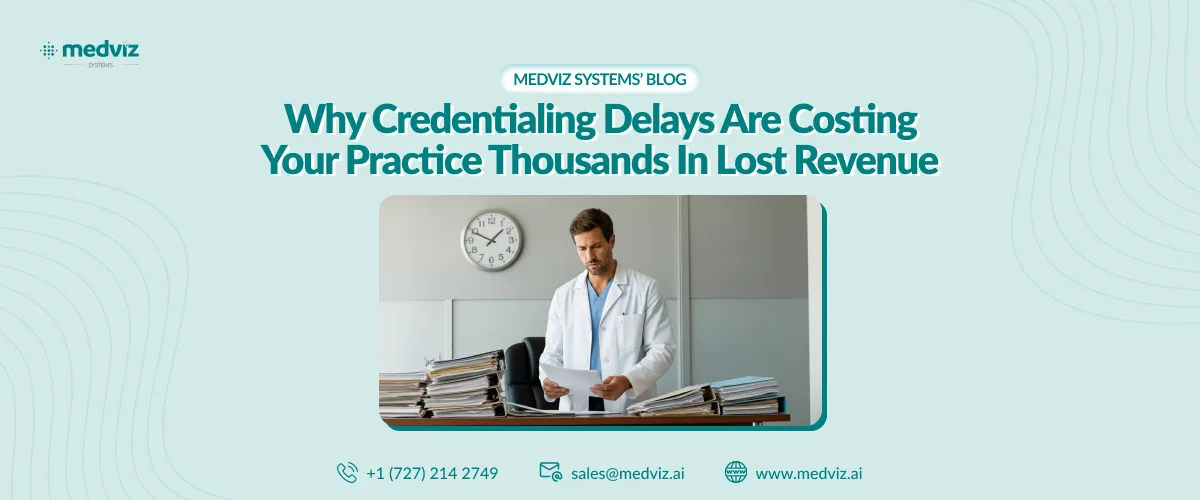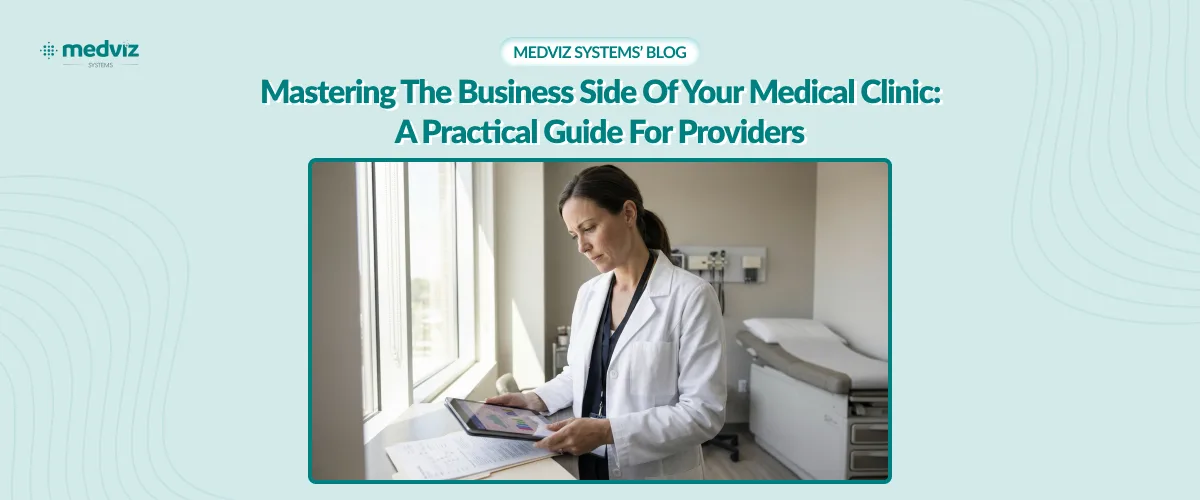Table of Contents
- 1. Introduction: The Hidden Revenue Killer in Healthcare
- 2. What Is Provider Credentialing and Why It Matters for Revenue
- 3. The True Cost of Credentialing Delays
- 4. The Hidden Risks Beyond Revenue Loss
- 5. Why Credentialing Bottlenecks Happen
- 6. How to Prevent Credentialing Delays and Protect Your Revenue
- 7. Turning Credentialing Into a Revenue Strategy
- 8. Conclusion: Act Now to Stop Losing Thousands
- 9. FAQs
Introduction: The Hidden Revenue Killer in Healthcare
Imagine hiring a highly skilled physician who’s ready to see patients, only to realize they can’t bill for a single visit because their credentialing hasn’t cleared. For weeks—or even months—you’re paying salary and overhead while revenue sits on hold.
Credentialing is the gatekeeper between providers and payers, and delays in this process represent one of the most overlooked revenue leaks in healthcare. According to industry data, credentialing delays can cost practices anywhere from $83,000 to $122,000 per provider over just a few months. For larger groups, the financial hit multiplies exponentially.
In this guide, you’ll learn why credentialing isn’t just paperwork—it’s a revenue strategy your practice can’t afford to ignore, along with proven steps to reduce delays, prevent denials, and protect your bottom line.
What Is Provider Credentialing and Why It Matters for Revenue
At its core, provider credentialing is the process of verifying a healthcare professional’s qualifications—licenses, education, work history, and background—before they can participate in payer networks and legally bill insurance for services.
Without completed credentialing:
- Providers cannot submit claims to payers.
- Claims may be denied or delayed indefinitely.
- Practices risk compliance violations and even legal penalties if they bill improperly.
Credentialing = Revenue Access. Credentialing is often viewed as a compliance requirement, but in reality, it’s a revenue enabler. Every day a provider waits to be credentialed is a day the practice loses billable hours and patient visits. For revenue cycle management, credentialing is just as critical as coding accuracy or claims submission.
The True Cost of Credentialing Delays
Credentialing delays don’t just create paperwork frustrations—they have tangible financial impacts.
Lost Billable Hours and Patient Volume
- Primary Care Physician: Missing 12 weeks of patient visits during credentialing = $83,520 in lost revenue.
- Specialist or Surgeon: Delays of 120 days can result in $122,144 in lost income.
- Behavioral Health Provider (e.g., LCSW): Delays equal to $20,332 in forgone billing opportunities.
For group practices, the cumulative effect is staggering. If you onboard 10 new providers in a year and each experiences a 3-month delay, you could lose well over $1 million in revenue.
Operational Inefficiencies and Labor Costs
- Credentialing teams often spend 20–40 hours per week chasing paperwork, verifying licenses, and communicating with payers.
- A Medallion survey found 46% of healthcare organizations report direct revenue impacts due to slow credentialing workflows.
- Nearly 60% of teams spend half a business day or more on primary source verifications, draining resources that could be allocated to patient-facing tasks.
The Ripple Effect
Delayed credentialing doesn’t just reduce billing—it slows down everything from provider scheduling to patient access. Practices are often forced to:
- Pay salaries for idle providers.
- Reschedule patients who can’t see their preferred doctor.
- Absorb frustration from both patients and staff.
The Hidden Risks Beyond Revenue Loss
Revenue is the most obvious casualty of credentialing delays, but the hidden costs are equally damaging.
Claim Denials and Compliance Issues
- Permanently lost revenue due to hard denials.
- Increased administrative overhead from appeals.
- Exposure to audits and penalties for billing non-credentialed providers.
Patient Care and Trust
Delays often mean fewer available providers, longer wait times, and limited access. Patients may:
- Switch to competitors who can see them sooner.
- Lose confidence in your practice’s ability to manage operations.
Legal and Accreditation Risks
- Accreditation status with payers may be compromised.
- Fines and legal consequences could arise from errors.
- Payer relationships can suffer long-term damage.
Why Credentialing Bottlenecks Happen
Credentialing delays aren’t inevitable—they’re often the result of preventable bottlenecks.
- Manual Workflows: 52% of organizations still rely on manual processes prone to human error.
- Incomplete Documentation: Missing licenses, transcripts, or work history slow everything down.
- Lack of Accountability: Without clear ownership, files sit in limbo.
- Staff Turnover: Burnout among credentialing specialists creates backlogs.
- Payer Variability: Different insurers require different forms and timelines.
Data spotlight: 57% of organizations report turnover in credentialing teams, compounding the delay problem.
How to Prevent Credentialing Delays and Protect Your Revenue
Credentialing doesn’t have to be a bottleneck. By applying the right best practices, you can shorten the process, maintain compliance, and safeguard your revenue.
1. Start Early
- Begin the credentialing process 90–120 days before the provider’s start date.
- Build credentialing into your recruitment workflow so providers are billable as soon as they arrive.
2. Standardize with Checklists
- Use structured onboarding checklists to ensure no steps are missed.
- Collect all required documents upfront—licenses, transcripts, malpractice insurance, references—before submitting to payers.
3. Leverage Technology
- Credentialing software automates license verification, sends reminders, and tracks application status.
- Tools like CAQH ProView streamline updates and reduce redundancy across multiple payers.
4. Outsource Strategically
- Partnering with credentialing service providers can cut administrative costs by up to 40% while accelerating timelines.
- Outsourcing also minimizes the risk of delays caused by staff turnover or limited in-house expertise.
5. Track & Audit Progress
- Monitor KPIs such as average credentialing time and denial rates linked to credentialing.
- Schedule quarterly audits to identify bottlenecks and ensure compliance with payer requirements.
6. Stay Ahead with Revalidation and Verification
- Credentialing isn’t one-and-done—most payers require revalidation every 2–3 years.
- Maintain current records for licenses, certifications, and malpractice insurance so nothing lapses.
- Automate reminders for recredentialing deadlines and CAQH attestations to avoid billing interruptions.
Turning Credentialing Into a Revenue Strategy
Instead of treating credentialing as a back-office burden, think of it as a strategic investment.
- Faster Onboarding = Faster Revenue: New providers generate billable hours sooner.
- Stronger Payer Coverage: More payer contracts mean broader patient access.
- Improved Cash Flow: Consistent, timely billing stabilizes revenue.
- Competitive Advantage: Faster credentialing helps recruit and retain top providers.
Conclusion: Act Now to Stop Losing Thousands
Credentialing delays aren’t just administrative hiccups—they’re serious revenue leaks. Every day a provider waits for credentialing is a day your practice loses thousands in billable hours. Add in compliance risks, claim denials, and patient access issues, and the true cost becomes staggering.
The good news? These losses are preventable. By starting early, standardizing processes, and partnering with the right experts, your practice can turn credentialing from a bottleneck into a strategic advantage.
Partner with Medviz Systems to Reduce Claim Denials & Boost Revenue Cycle Efficiency
📞 Call: +1 (727) 214-2749
📧 Email: sales@medviz.ai
- ✅ Improve claim accuracy
- ✅ Reduce administrative waste
- ✅ Accelerate reimbursements
So your team can focus on delivering exceptional patient care — not chasing payments.
👉 Don’t let credentialing delays and denials drain your bottom line. Contact Medviz Systems today and protect every dollar your practice earns.
FAQs
Q: How long does credentialing usually take?
Credentialing typically takes 60–120 days, depending on the payer and provider type. Starting early can shorten this timeline.
Q: How much revenue can a practice lose during credentialing delays?
Estimates range from $5,000–$10,000 per day per provider, adding up to $80,000–$120,000 over 3–4 months.
Q: Is outsourcing credentialing worth it?
Yes—outsourcing can reduce labor costs, speed up timelines, and free up internal staff for higher-value tasks.



Leave a Reply